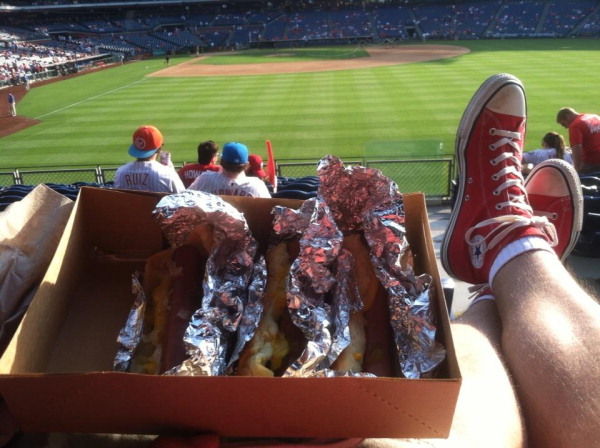By Mike Morsch, Executive editor
Another baseball season is upon us, which is a reminder that there’s always been a rule in our family: Never leave a ballgame early.
It’s not only because something fun or unusual might happen, but because we go to the ballpark to enjoy the game, its sounds, smells and ambiance, not because we want to leave early and beat the traffic home.
Well, the Philadelphia Phillies certainly tested that rule on May 25, 2011, with a 19-inning tilt against the Cincinnati Reds.
And I was there. For … the … whole … thing. All six hours and 14 minutes’ worth. Joining me for the bonus baseball was my oldest daughter, who has grown up with the family’s rules and is well aware of them.
We are a baseball family and I had reminded her in passing as the game entered the 10th inning that we never leave a game early. At that point, neither of us suspected we’d be there for another nine innings.
“I know the family rule,” she said matter-of-factly.
As if to further demonstrate her understanding of the family rule, she turned to me after the 18th inning and said: “It would be kind of a half-assed effort on our part if we were to leave after the 18th inning, wouldn’t it?”
Atta girl. When one’s daughter describes a six-hour, 18-inning effort at 1 a.m. as “half-assed” if we don’t see it through until the end, that demonstrates a pretty good grasp of the We Never Leave a Ballgame Early Rule.
Among the unique aspects of that game was that the Phils’ winning pitcher ended up being position player Wilson Valdez, who became the first player to start a game in the field and end up getting the win on the hill since Babe Ruth did it a bazillion years ago. Raise your hand if you thought the names Babe Ruth and Wilson Valdez would ever be mentioned in the same sentence for any reason.
I enjoyed having both a Seventh Inning Stretch and a 14th Inning Stretch, where we got to sing “Take Me Out to the Ballgame” twice in the same game. I have no doubt that if we had made it to the 21st inning, we would have sung again. (At one point on the scoreboard, it was revealed that the Phillies longest game in team history was a 21-inning contest against the Chicago Cubs in 1918.)
However, the most unusual and challenging aspect for my daughter and I ended up being the keeping of the scorecard. I’ve kept a scorecard at every game I’ve been to since I was a kid. And as an adult, she had expressed an interest in that part of going to the ballgame, and I had been teaching her the intricacies of scorecard keeping on the games we attended that season.
The problem with the Phillies pre-printed scorecards then was that they provided space for only 10 innings. There are additional columns for game totals that, if necessary, can be used to get one through 14 innings of scorekeeping.
But neither the Phillies nor the Reds cooperated by scoring any runs from the 11th through the 18th innings. So we were forced to get creative with the scorecard and write in the margins and then eventually, turn the scorecard vertically and utilize any vacant spaces that could be found.
And we each got the whole game scored on our separate scorecards. Had it gone past 19 innings, I’m not sure what we would have done because we truly were out of space at that point. Older Daughter suggested afterward that she would have written on a napkin and stapled it to the scorecard if the game had continued. “You don’t come that far to have an incomplete scorecard,” she said.
If one uses a napkin at the ballpark for anything other than wiping mustard off one’s chin, well, that’s diehard baseball fandom right there.
The game ended around 1:15 a.m., and the Phillies rewarded us by winning. I dropped my daughter off at her house and made it home by 2:30 a.m. We both had to go to work the next morning, and the late night made for a long day the next day.
About midday, I sent her a text message: “I know it was a long night, which is making for a tough day today, but I’m happy you were with me last night.”
She responded: “Yeah, I had a really good time. Thanks for a good memory.”
And that’s what it indeed became, a great memory. It was a unique baseball game for sure, but it turned into a unique father-daughter experience that just the two of us share, a story that maybe someday she’ll tell her children.
It was a special evening, but not because the Phillies and Reds played 19 innings. It was special because I got to share it with my daughter.
And that’s why we never leave a ballgame early. Because there’s a chance, if one is lucky, that it ends up being about something other than baseball.
Mike Morsch is executive editor and digital news director of Packet Media Group. He can be reached by email at [email protected].

